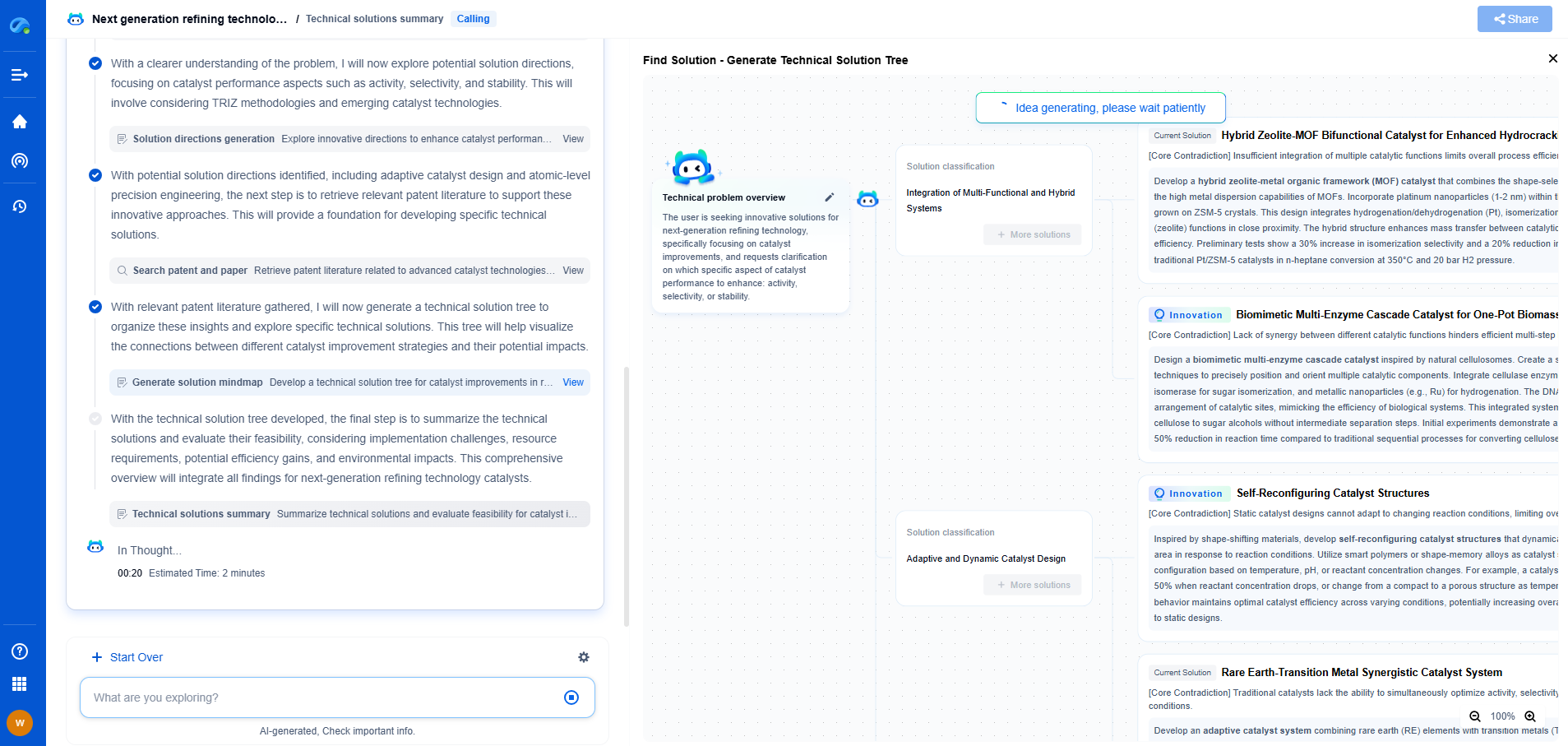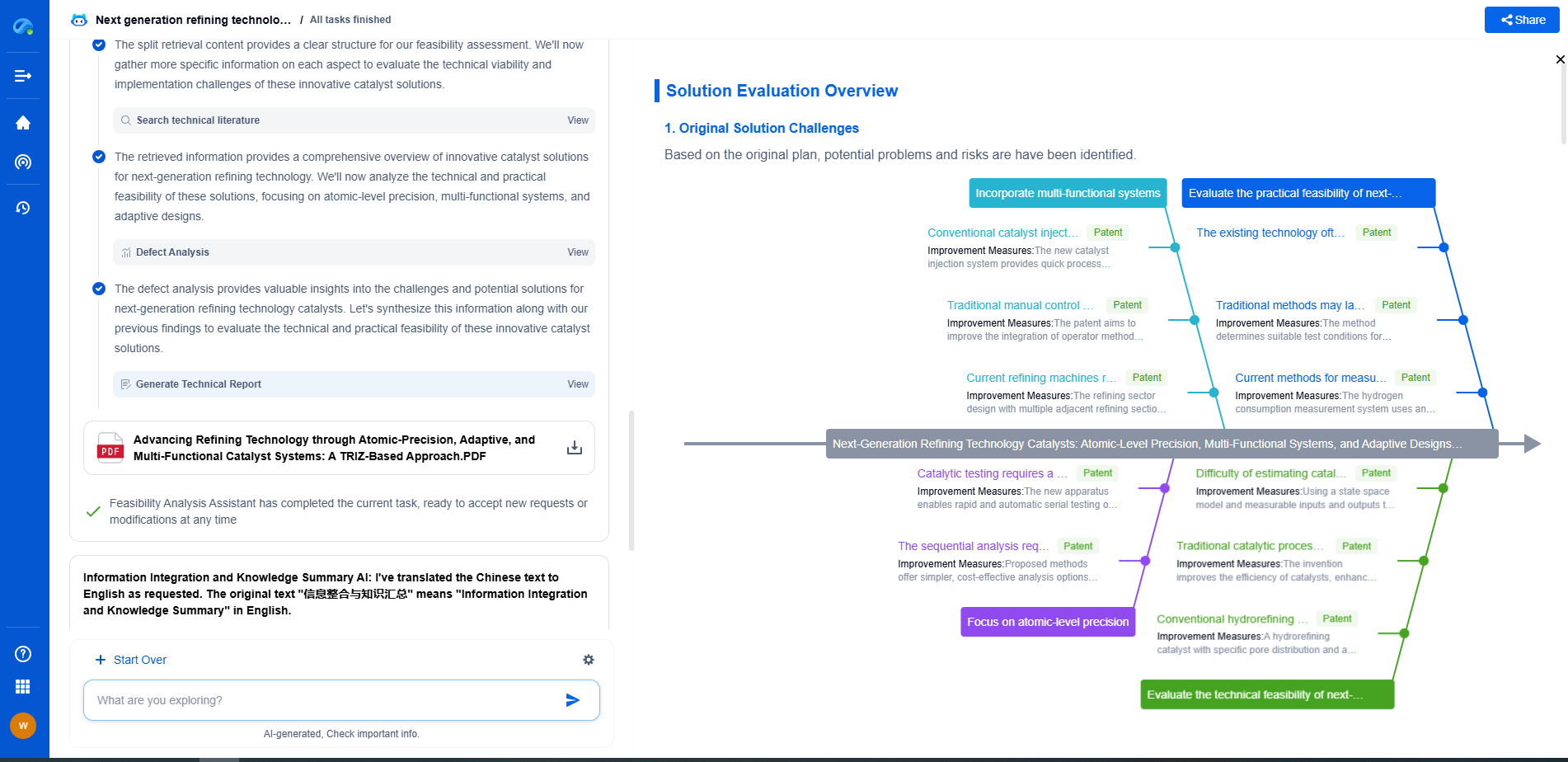What Is the Role of Big Data in Pipeline Integrity?
JUN 20, 2025 |
Pipeline systems are critical infrastructure for transporting oil, gas, and other fluids over long distances. Ensuring their integrity is essential to prevent leaks, spills, and other failures that can have catastrophic environmental and economic impacts. Big data plays a crucial role in enhancing pipeline integrity by providing comprehensive insights, predictive analyses, and real-time monitoring capabilities.
Data Collection and Integration
The first step in leveraging big data for pipeline integrity is data collection. Pipelines are equipped with various sensors and monitoring devices that continuously gather data on pressure, temperature, flow rates, and other critical parameters. These sensors can detect anomalies and changes in operating conditions that may indicate potential integrity issues.
Big data platforms are designed to handle large volumes of data from diverse sources. They integrate data from sensors, inspections, maintenance records, and external factors such as weather conditions and seismic activity. By consolidating this information, operators gain a holistic view of pipeline operations, enabling more accurate assessments of their condition.
Predictive Analytics and Maintenance
One of the most significant advantages of big data in pipeline integrity is its ability to facilitate predictive maintenance. Traditional maintenance schedules are often based on fixed intervals, which can either lead to unnecessary servicing or delay critical repairs. Big data analytics use historical data and machine learning algorithms to predict when components are likely to fail or require attention.
Predictive models analyze patterns and correlations within the data to forecast potential issues before they occur. This proactive approach allows operators to prioritize maintenance activities based on actual needs, optimizing resource allocation and reducing downtime. By addressing issues early, operators can prevent minor problems from escalating into major failures.
Real-Time Monitoring and Response
Real-time monitoring is another vital aspect of pipeline integrity facilitated by big data. Advanced analytics and data processing enable operators to continuously track pipeline conditions and detect anomalies as they happen. This immediate analysis empowers them to take swift corrective actions, minimizing risks and safeguarding the environment.
For instance, if sensors detect a sudden drop in pressure, big data systems can quickly identify the location and potential cause of the issue. Operators can then deploy teams to inspect and address the problem, avoiding potential leaks or ruptures. The ability to respond rapidly reduces the likelihood of severe incidents and enhances overall pipeline safety.
Compliance and Risk Management
Pipeline operators must adhere to strict regulatory standards to ensure safety and environmental protection. Big data helps streamline compliance efforts by providing detailed records and analyses that demonstrate adherence to these standards. Automated reporting capabilities simplify documentation processes, reducing the administrative burden on operators.
Additionally, big data enhances risk management strategies by identifying vulnerabilities and assessing the potential impact of various threats. By understanding the risks associated with pipeline operations, companies can implement targeted measures to mitigate them, ensuring that pipeline integrity is maintained even in challenging circumstances.
Conclusion
The role of big data in pipeline integrity is indispensable. By offering comprehensive data collection, predictive analytics, real-time monitoring, and enhanced compliance capabilities, big data transforms how operators manage and maintain pipelines. It empowers them to make informed decisions, optimize maintenance efforts, and swiftly respond to potential issues, ultimately safeguarding both the environment and their infrastructure. As technology continues to advance, the integration of big data into pipeline operations will become increasingly important in ensuring the safe and efficient transport of critical resources.
Transform the Way You Innovate in Pipeline Technology—with AI-Powered Intelligence
From corrosion-resistant materials to smart monitoring systems and advanced flow control mechanisms, the pipeline industry is undergoing rapid technological transformation. Yet keeping up with evolving engineering solutions, regulatory landscapes, and competitive patents can be a major bottleneck for R&D and IP teams.
Patsnap Eureka is your AI-powered research companion—built specifically for professionals in high-tech and infrastructure domains like pipeline technology. Whether you're designing high-pressure transport systems, assessing trenchless installation innovations, or safeguarding proprietary flow assurance solutions, Eureka provides real-time insights into global patent trends, emerging technologies, and R&D intelligence—all in one intuitive interface.
Empower your team to innovate faster, reduce technical blind spots, and stay ahead of industry shifts. Discover Patsnap Eureka today and bring clarity and confidence to your pipeline technology decisions.
- R&D
- Intellectual Property
- Life Sciences
- Materials
- Tech Scout
- Unparalleled Data Quality
- Higher Quality Content
- 60% Fewer Hallucinations
Browse by: Latest US Patents, China's latest patents, Technical Efficacy Thesaurus, Application Domain, Technology Topic, Popular Technical Reports.
© 2025 PatSnap. All rights reserved.Legal|Privacy policy|Modern Slavery Act Transparency Statement|Sitemap|About US| Contact US: help@patsnap.com

